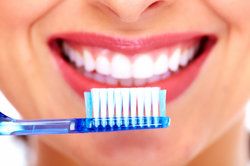Extend the Lifespan of Your Porcelain Crowns
 When a tooth has been damaged or reduced in size to the point where it requires permanent protection, a dental crown is an ideal restoration. Whether a tooth has suffered from decay, erosion, or physical injury, dental crowns can restore your smile without the need for tooth extraction or replacement. And because porcelain is an ideal dental material in its ability to replicate the texture and color of a tooth, crowns can go virtually unnoticed among the rest of your teeth.
When a tooth has been damaged or reduced in size to the point where it requires permanent protection, a dental crown is an ideal restoration. Whether a tooth has suffered from decay, erosion, or physical injury, dental crowns can restore your smile without the need for tooth extraction or replacement. And because porcelain is an ideal dental material in its ability to replicate the texture and color of a tooth, crowns can go virtually unnoticed among the rest of your teeth.
As effective as crowns are, their lifespan is still limited by the ongoing care they receive. If you have porcelain crowns or are planning on undergoing a crown procedure, here’s how you can extend the life of your crowns.
The Lifespan of Porcelain Crowns
It is difficult to estimate how long any restoration will last, as all dental work requires good hygiene and general care. If patients are negligent in their hygiene or do not take the right precautions, even the strongest dental materials will need to be replaced. Assuming a crown does not incur much wear and no decay forms around it, patients can expect the average porcelain crown to last up to 15 years. However, with excellent dental maintenance, it’s possible for crowns to last 25 or 30 years before needing replacement. As always, ongoing visits with your cosmetic dentist are the best way to assess the health of your teeth and restorations.
The Importance of Hygiene
While it is true that dental restorations cannot suffer from decay in the same way teeth can, nearby dental problems are still a viable threat to the lifespan of dental crowns. After all, underneath each crown is a tooth that is susceptible to bacteria and disease. If a crowned tooth requires treatment, the crown will thus have to be removed and later replaced. Hygiene is therefore as important to your porcelain crowns as it is to natural teeth, if not more so.
The good news is that crowns do not require any special hygienic treatment. The same rules of brushing, flossing, and occasional dental check-ups apply:
- Brush two-to-three times daily with fluoride toothpaste
- Use a soft-bristled toothbrush, replacing it every four months or so
- Floss once daily, being careful to curve the floss around every edge
- For extra hygienic care, consider using a mouth rinse daily
In addition to at-home hygiene, be sure to keep up with your routine professional check-ups and cleanings. Despite brushing and flossing, some plaque and tartar will almost certainly remain on teeth and gums. With a scaling and polishing procedure, your dentist can ensure the continued health of your teeth and, in turn, your crowns.
Protecting Your Crowns from Damage
In regard to regular biting and chewing habits, porcelain is a relatively durable material that sustains very little wear. Nevertheless, when under excessive or unnatural pressure, porcelain crowns are prone to chip or break. Just as sudden trauma can damage a tooth, so too can it permanently damage a crown. Therefore, if you are engaged in any risky physical behavior such as contact sports, consider the benefits of a mouth guard. By protecting your teeth from injury, you can ensure that the lifespan of your crowns is not unexpectedly cut short. For maximum protection and comfort, speak with your dentist about the use of a professional, customized mouth guard.
However, it doesn’t take extreme force to chip or crack a crown. Any foreign object can damage a crown when exerting unnatural force upon it. Chewing on one’s nails or using one’s teeth as a tool can both result in damaged crowns. As a simple rule, avoid chewing on anything other than food.
Bruxism as a Risk Factor
Teeth grinding, or bruxism, is another potential risk factor for porcelain restorations. If you have a habit of grinding or clenching your teeth, your crowns may be in danger of getting broken or chipped. Bear in mind that bruxism tends to occur during sleep, meaning many patients do not even realize they have this condition. Possible symptoms of bruxism include:
- Toothaches
- Headaches
- Neck, jaw, or ear pain
- Difficulty sleeping
- Chipping or erosion of teeth
If you suspect you may have bruxism, speak with your doctor about its potential effects on your teeth and restorations. If your teeth grinding does indeed pose a risk, you may be recommended a night guard to wear while asleep.
Make Your Crowns Last
To keep your teeth and crowns healthy, schedule an appointment with us for an exam and cleaning. If you are concerned about the condition of your crowns, consult Drs. Charles and Patrick Casey on possible treatment, repair, or replacement.



